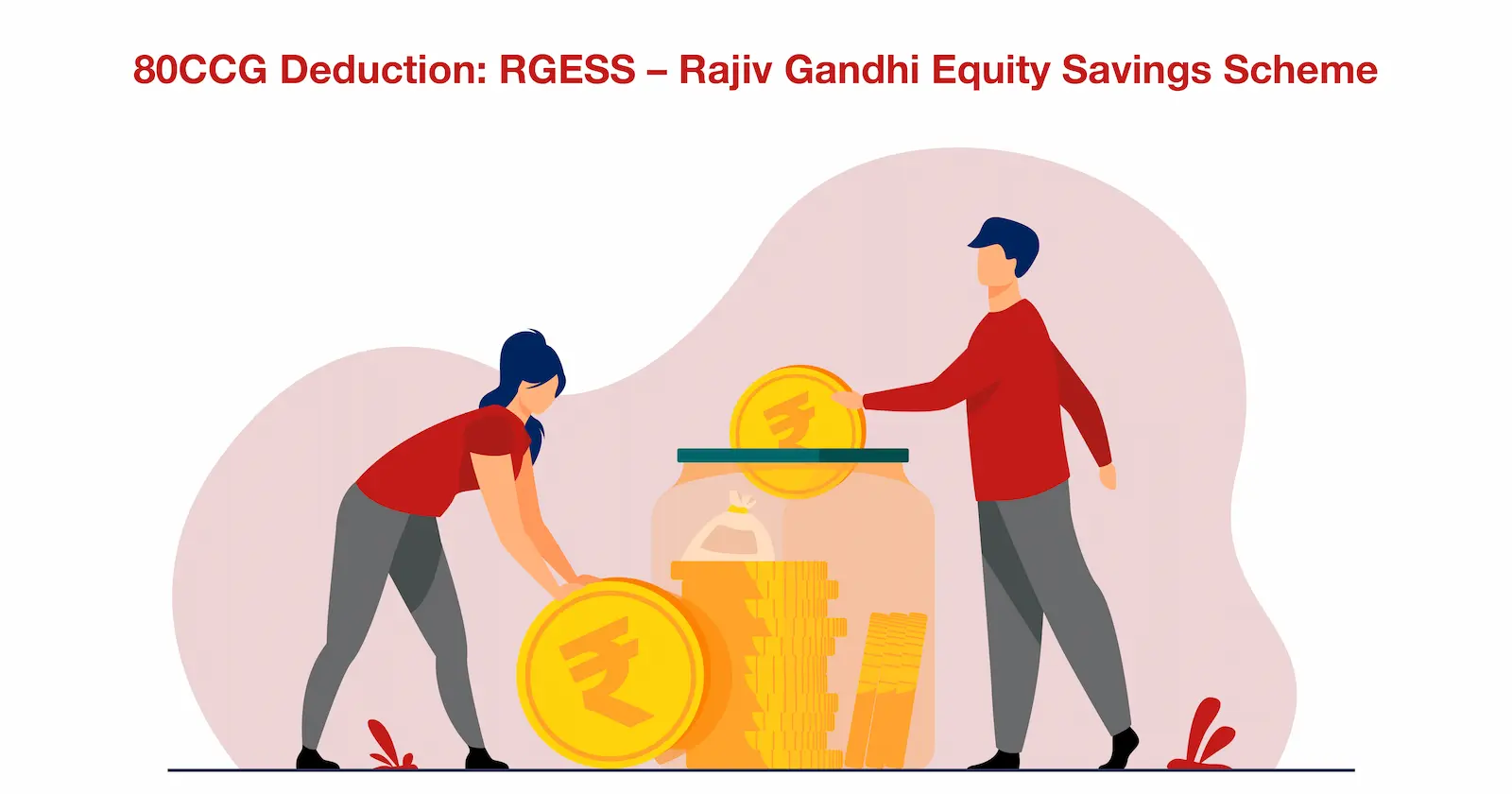With the Union Budget 2012-13, the Central Government introduced the Rajiv Gandhi Equity Savings Scheme (RGESS) to encourage new retail investors to enter and simultaneously grow the country’s capital markets. RGESS, legally known as the Income Tax Act’s Section 80CCG, was also aimed at increasing the flow of savings by encouraging people to invest in the equities market. Investors can claim a deduction of 50% on the invested amount. However, this is capped at a maximum investment amount of ₹50,000. Therefore the maximum deduction that can be claimed under this section is ₹25,000 in a financial year.
Key features of Rajiv Gandhi Equity Savings Scheme:
- This deduction is available to resident individuals only.
- The income of the assessee in the year of claiming deduction must not exceed Rs 12 Lakh.
- The investor must be a new retail investor.
- The deduction allowed under RGESS is 50% of the total amount invested subject to deduction permittable upto maximum investment amounting to Rs 50,000.
Eligible securities for tax deduction under the Rajiv Gandhi Equity Savings Scheme:
The following securities were eligible for tax deduction under the Rajiv Gandhi Equity Savings Scheme:
- Equity shares falling in the list of securities titled “BSE-100” or “CNX-100”.
- Public Sector Enterprise equity shares falling under the categories of Navratna, Maharatna, or Miniratna by the Indian Central Government.
- Units of both Mutual Fund (MF) schemes and Exchange Traded Funds (ETFs) having underlying securities applicable under the Rajiv Gandhi Equity Savings Scheme. The units must be recorded and exchanged on stock markets, and shared must be cleared through depository systems.
- Follow-on Public Offers (FPOs) of applicable securities.
- New Fund Offers (NFOs) of applicable ETFs and mutual funds.
- Unlisted Equity Shares: Initial Public Offers from Public Sector Undertakings. These must be registered to be listed in the suitable financial year, and where the government holds a minimum of 51%. Additionally, the annual turnover of such sectors should not be less than ₹4,000 crores for each of the past 3 years.
How to use Rajiv Gandhi Equity Saving Scheme:
- First-time investors could invest up to ₹50,000 in securities with an RGESS scheme. With this limit, they could claim a deduction of 50% on their investment amount.
- Specifically, first-time investors, with an annual income under ₹12 lakhs, were allowed an additional tax deduction under Section 80CCG with RGESS. However, there were certain limitations.
- The deduction is applied in the case of new investors investing in the aforementioned companies or mutual funds schemes, or as specified by RGESS.
Major Benefits of Rajiv Gandhi Equity Saving Scheme:
- The permissible tax deduction under Section 80CCG was over and above the ₹1.5 lakhs limit as per Section 80C of the Income Tax Act, 1961. This made RGESS a good option for young middle-class investors.
- Moreover, the benefits could have been availed for 3 consecutive years. Investors that got into the scheme prior to April 2017 can continue to get the benefit till the 3-year period is over.
- A company may be liable to a dividend distribution tax. Under RGESS, the Dividend for investments in these companies is income tax-free.
Eligibility conditions for People seeking tax deductions under Section 80CCG:
Certain eligibility conditions have to be met by persons seeking tax deductions under Section 80CCG. These are:
- Retail investors who are Residents of India
- The investor has no history of trading in the derivatives market and equity market
- The investor must follow compliance with the scheme
- Must have a gross total income of less than or equal to INR 12 lakh for the financial year
- The investments can only be made in companies that belong to BSE-100 or CNX-100 and their “follow-on public offers”
- Investments have to be made only in IPOs of PSU with 51 percent or more government holding
- Investments can be made only in Mutual Fund or Exchange Traded Fund Schemes that invest in RGESS eligible securities and their “New Fund Offers” – NFO
- Investments can be made only in PSUs that are designated as Maharatna, Navratna or Miniratna and their “Follow-on Public Offers”
Section 80CCG for AY 2016-17 | Section 80CCG for AY 2017-18
Tax benefits offered to investors are liable to be withdrawn if they are unable to meet any of these eligibility conditions. However, the RGESS saw very little uptake from citizens which led to its being phased out since April 2017. Any new investors starting Financial Year 2017-18 would not be able to claim deductions under Section 80CCG, but investors who had raised claims in 2016-17 and before will be able to claim deductions even in FY 2017-18.



Comments